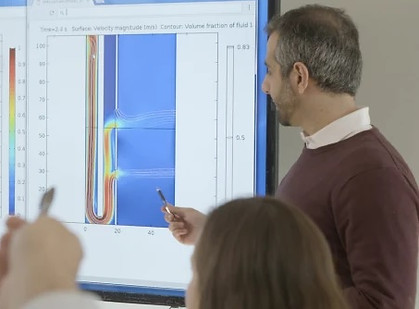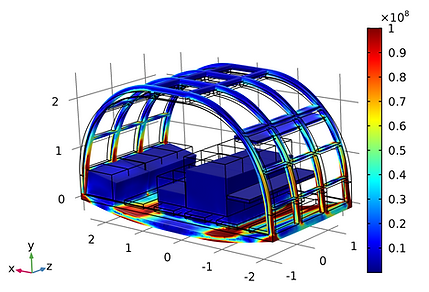
Analysis & Simulation
A mathematical model can be used to predict important properties of a device, based on its geometry, tabulated material properties, and the equations describing relevant physics. We do standalone modeling and analysis projects, and also use modeling frequently in our design process.
Capabilities
-
Structural mechanics
-
Heat transfer and thermodynamics
-
Computational Fluid Dynamics (CFD)
-
Electric currents
-
Electromagnetic waves
-
Radiation physics
-
Particle tracing
-
Finite Element Modeling
-
Partial and ordinary differential equations
-
Algebraic models
-
Monte Carlo models
-
Multiphysics simulation
-
Optimization of geometry
The first and simplest tool for a physics model is a pencil and paper, which is usually sufficient. Another quick modeling tool is SolidWorks with built-in simulation functions that are useful for finding stress concentrations and deflection of the part.
For finite element modeling of structural, electrical, thermal, and fluidic systems, or for fully-custom equation-based PDE modeling, we typically use COMSOL Multiphysics. We use SolidWorks LiveLink and the Optimization module to perform overnight nonlinear constrained optimization on part geometries.
We also use a number of domain-specific tools. We frequently use ANSYS Mechanical to calculate normal modes in aerospace parts, check for engineering margins, and to optimize the parts for weight. For printed circuits, we use POLAR to design stackups and calculate trace specifications. For radiation physics, we use GEANT4 from CERN. Finally, for full-custom from-scratch physical modeling, we typically use MATLAB.

CFD analysis of the McDonald's S.T.R.A.W.
Additional Information
NK Labs offers electrical, mechanical, and software engineering services and can serve as a one-stop shop for any technical project.

COMSOL simulation of aircraft cabin structure under load (courtesy of Airbus)